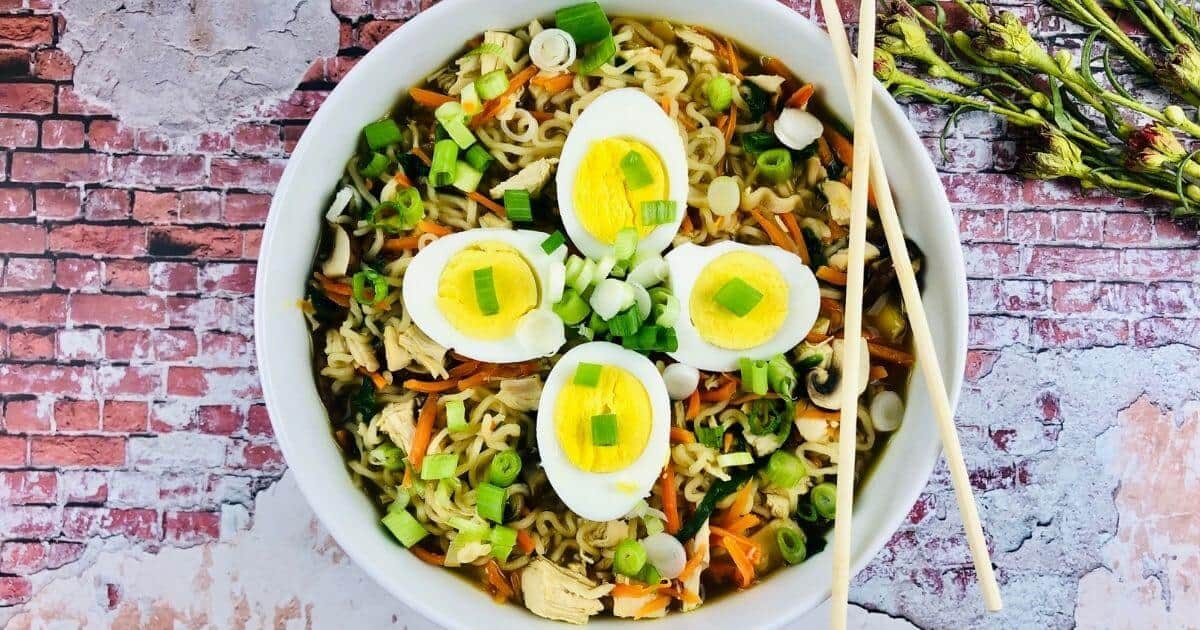
Gluten Free Ramen Noodles
If you are a ramen soup lover, then you'll love these gluten free ramen noodles! It will be just as quick and delicious as the typical ramen noodles you may remember from childhood.
This easy recipe tastes just like a restaurant ramen bowl right from your own home and without any gluten.
We may receive a small commission on certain products or services mentioned in this post. Please read our full Disclosure Policy for more information.
Ramen noodles are a classic staple of early adulthood and college days alike. This quick and easy dish is not only a cheap way to enjoy noodles but a tasty take on an Asian-inspired classic.
Most store-bought ramen noodles are not gluten-free. However, this DIY gluten-free ramen noodle recipe will help you quickly whip up your ramen noodles in no time at all.
Ramen noodles are savory and tasty, yet filling and easy to make.
This ramen noodle recipe uses fresh vegetables, hard-boiled eggs, and store-bought ramen noodles. These ingredients create a delicious dish that is just as quick as ordering a bowl of ramen at a restaurant.
With this recipe, you can make your own cup of noodles right at home. It is so much better than the prepackaged stuff and will taste so fresh!
Gluten-free ramen noodles are a great dish for those with a gluten allergy. It is also great for those who don't usually have gluten intolerance but would still enjoy the flavor of this Asian classic.
This recipe is also an excellent option for vegetarians, as it lacks many proteins that may not be suitable for some diets.
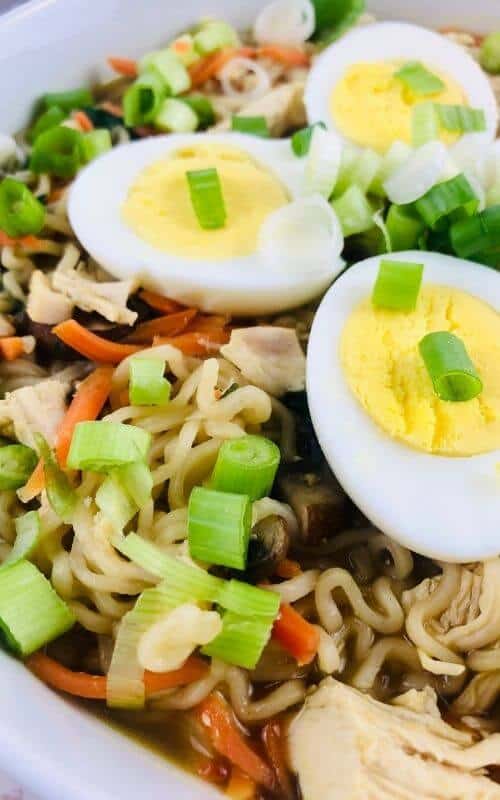
What is Gluten?
Gluten is a substance that's found in wheat, barley, and other grain products. Gluten has a protein called gliadin and it can help hold bread together for example.
This substance can be harmful because it can cause damage to the lining of the intestinal tract. This can reduce your ability to absorb nutrients like iron, calcium, vitamin D, and B12.
If you have celiac disease, gluten can even lead to serious health problems over time. It could also happen right away (kidney damage for example).
So it is very important to avoid gluten if you have celiac disease, gluten intolerance, or wheat allergy, or you just don't want to take the risk.
The gluten-free diet may seem restrictive at first, but fortunately, there are plenty of delicious foods that can be enjoyed. Some of these include millet, buckwheat, quinoa, and rice noodles.
These ramen noodles will make your favorite recipes healthy again while still maintaining their traditional flavor profile.
So what do you do? Make sure these awesome gluten-free noodle bowls happen in your kitchen today. They're sure to become a favorite for your family in no time!
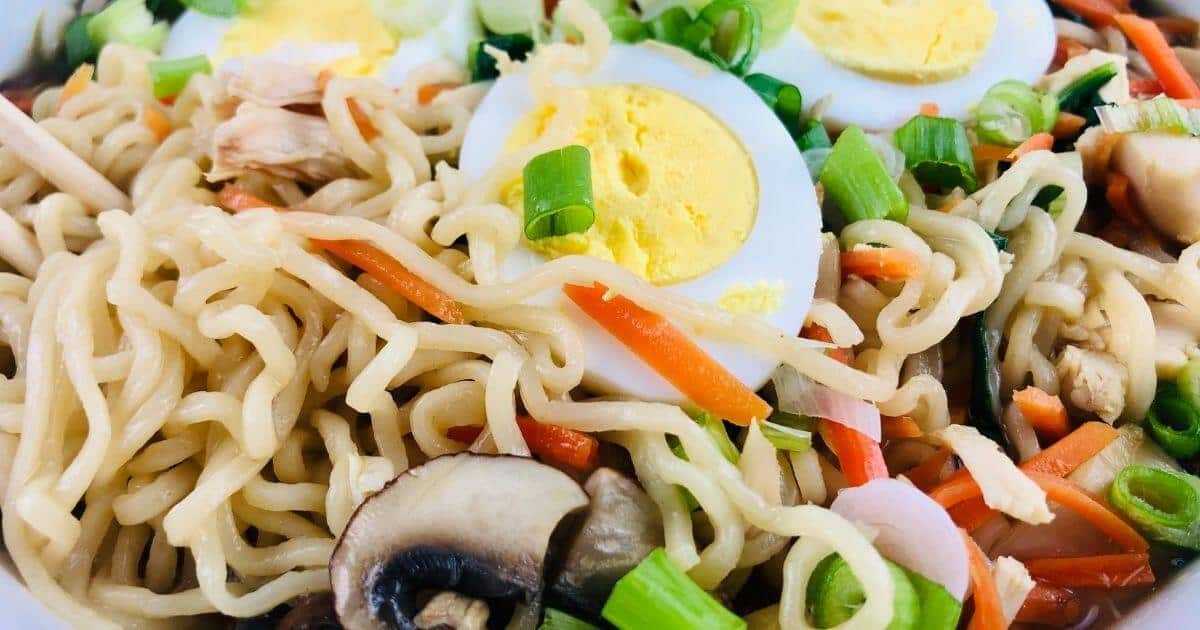
What Are Ramen Noodles Made of?
Ramen noodles are typically made from wheat flour, as well as other vegetable oils and flavorings.
If you are on a gluten-free diet, you need to be careful of not only the noodles but also the seasonings that come with them. Both of these ingredients can contain gluten and wheat.
If you want to make your own ramen noodle soup at home instead of buying packaged varieties in stores or online, keep reading to check out my gluten-free ramen noodles recipe towards the end of this article.
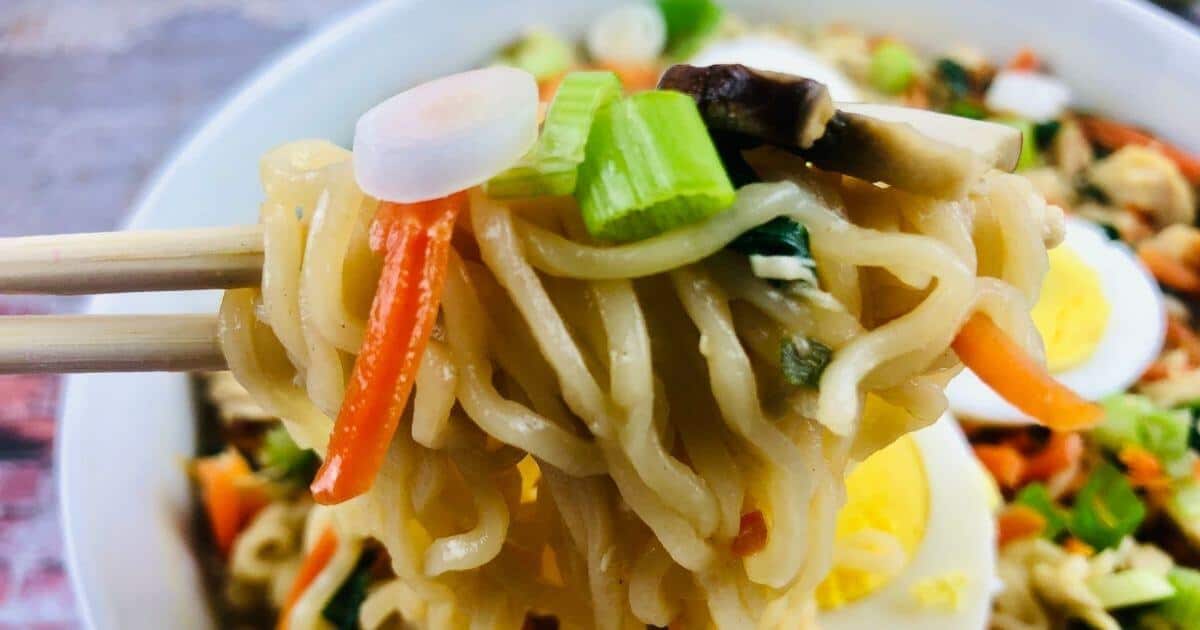
Is Ramen Gluten-free? Do Ramen Noodles Have Gluten?
Most ramen is traditionally made with wheat flour. However, many ramen noodles are made using brown rice flour to make them gluten-free.
The noodles themselves are not typically gluten-free, but you should also be wary of what is in the soup. Just be sure to check the ingredients label for any marked allergens before purchasing.
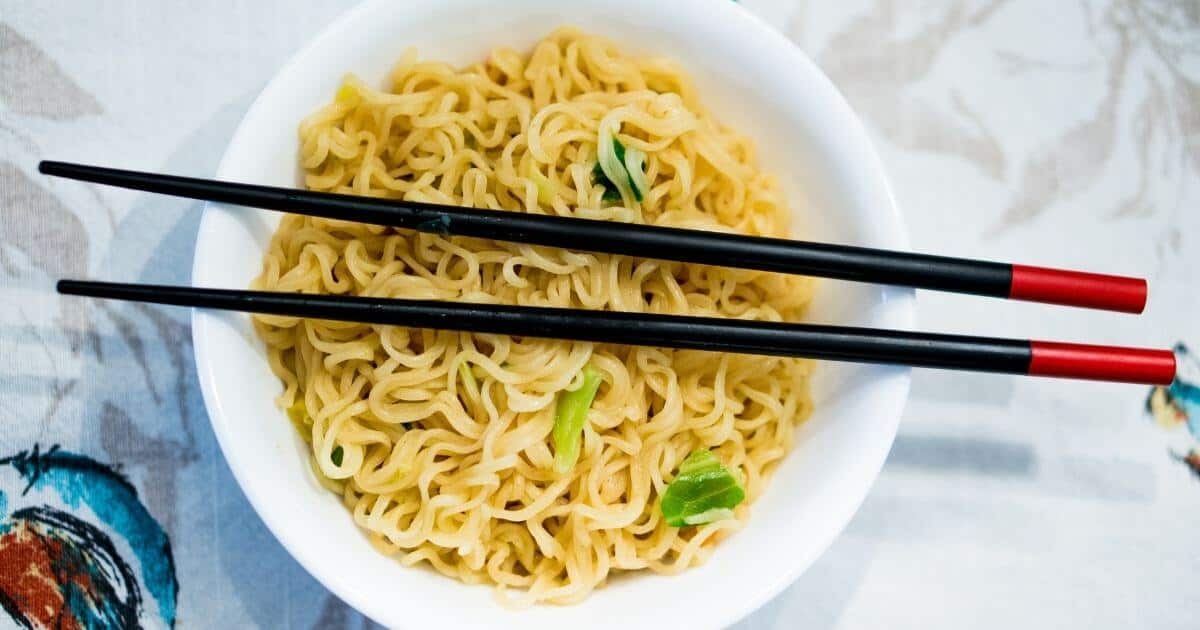
Is There Any Gluten-free Ramen?
Yes, there are a variety of gluten-free ramens available. King Soba and Lotus Foods offer brown rice gluten-free noodles.
When headed to your local grocery store to shop for some yummy gluten-free noodles for your DIY ramen bowl, you will want to stick to thin rice noodles.
These are typically found in the ethnic section of the store. They could also be found in the pasta aisle, gluten-free or health market area, or next to the other ramen noodles.
If you're looking for noodles that are gluten-free, pay close attention to the labeling. Look for packages that are clearly marked as gluten-free. Otherwise, you may end up with a box of noodles that could possibly have some gluten in them.
If you cannot find any gluten-free noodles, then you could always substitute the rice noodles for actual rice. However, you should be able to find some somewhere!
Don't worry, If you have been diagnosed with Celiac disease or you are someone with gluten or wheat intolerance, you can still enjoy some delicious ramen!
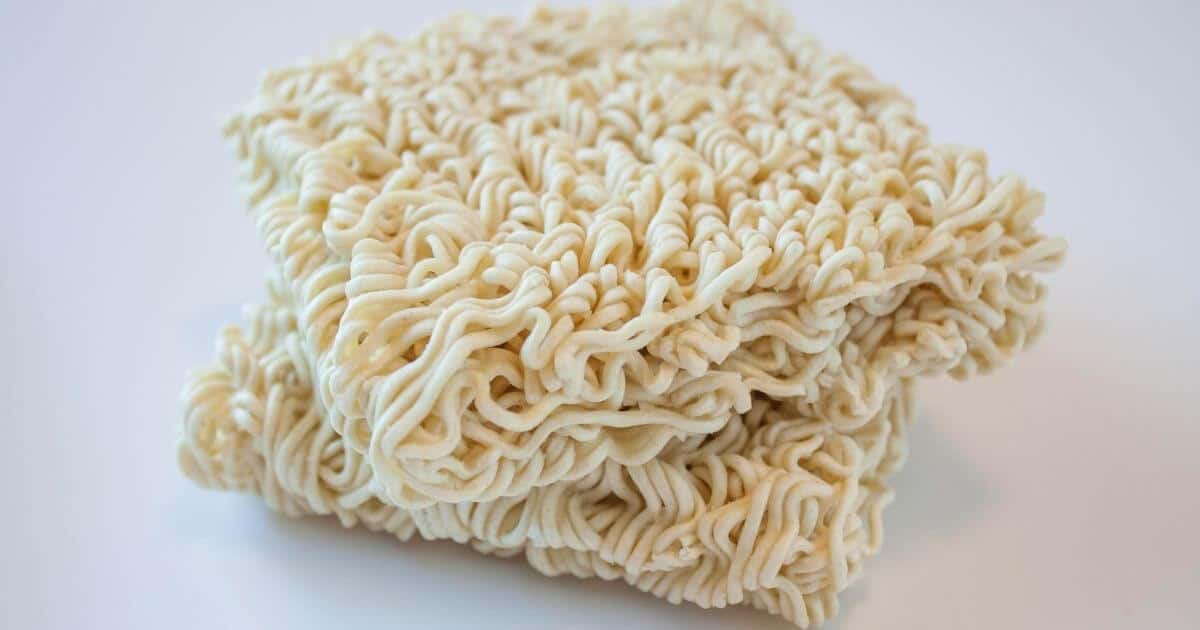
Who Sells Gluten-free Ramen?
You can find King Soba gluten-free ramen or Lotus Foods in most grocery stores and there are even a few options on Amazon. You can also find gluten-free noodles at Walmart, Target, and other name-brand stores.
The gluten-free versions of ramen noodles are a little more expensive than the regular ramen, but they're definitely worth it.
To ensure that no cross-contamination occurs, make sure to look for gluten-free labeled packages on the shelf.
If you prefer to order online instead of going out and searching through the aisles at your local store, you can find quite a few great gluten-free noodle brands on Amazon as well as on some of the product websites.
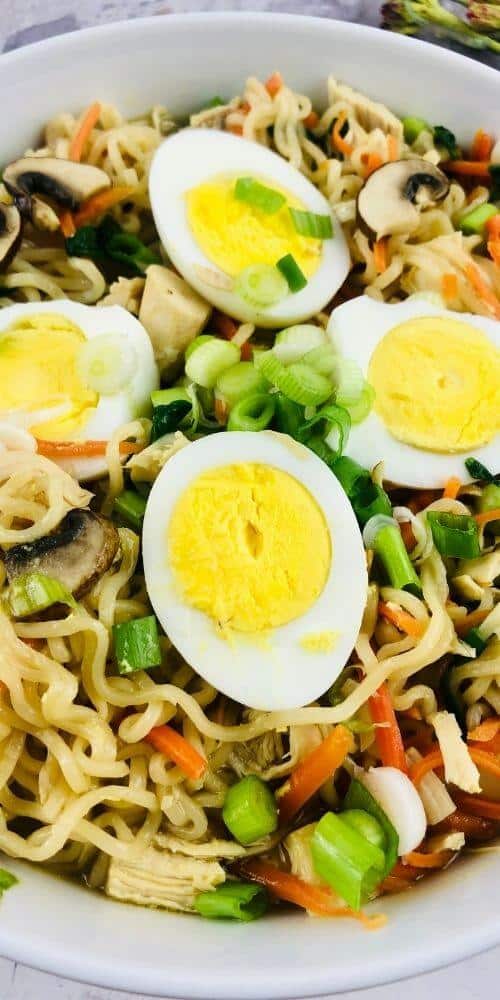
What Are The Best Gluten-free Ramen Noodles?
If you are looking for an excellent gluten-free substitute for traditional, rice noodles taste just as good as regular ramen noodles.
These noodles can be found in grocery stores and Asian markets. They are often called `rice sticks'. You can substitute the rice noodles for white rice if that is what you would prefer.
You most likely have an Asian market in the area that would have some great options. Just google "Asian market near me" to find one that is local to you.
You could also look at Whole Foods or Trader Joe's for some good options that they have available in their brand.
One of the best gluten-free brands in my opinion is Eden Foods. Their Soba, 100% Buckwheat, Organic pasta would be perfect in your homemade ramen dish!
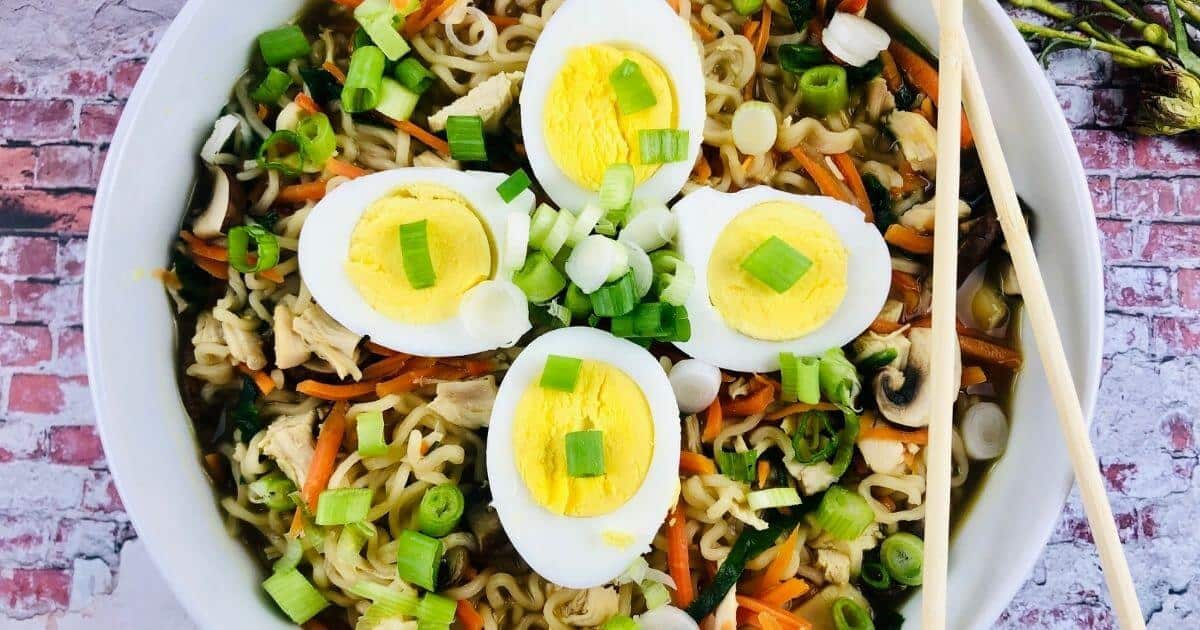
Is Maruchan Ramen Gluten Free?
Unfortunately, all of Maruchan’s Ramen is made using wheat flour and contains gluten. Also, the seasoning packets contain gluten as well.
Some good replacements for Maruchan would be Lotus Foods Brown Rice Ramen, Gefen Brown Rice Noodles, or King Soba Ramen Noodles.
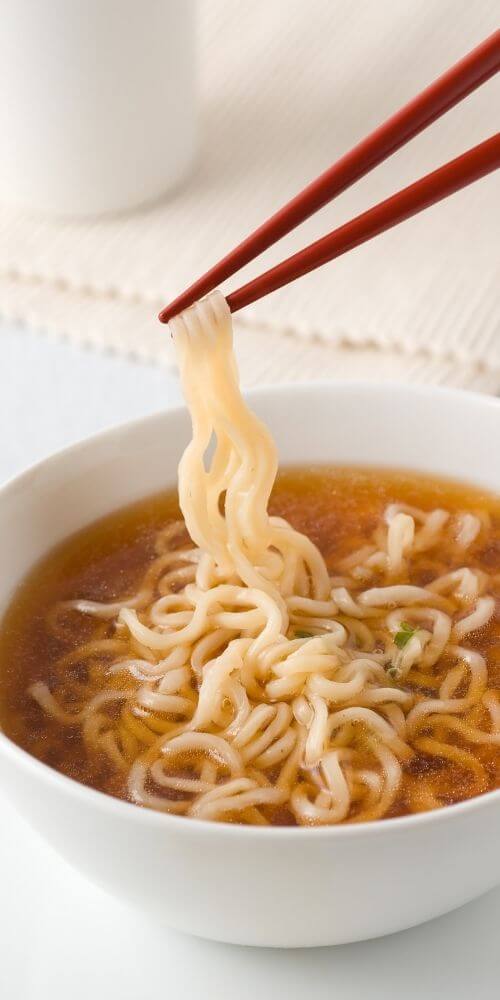
Making Gluten-Free Ramen Noodles at Home
You don’t have to make your own ramen noodles from scratch to enjoy the delicious taste of ramen noodles.
There are many store-bought ramen noodle brands out there that are gluten-free and make creating your own ramen noodle bowls so easy without having to go to a restaurant.
There are many gluten-free noodles that have a texture similar to traditional ramen noodles. However, not all of them taste the same or hold up as traditional ramen does.
A lot of gluten-free noodle brands also provide seasoning packets that allow you to make a delicious hot soup broth to go with your noodles. There are many great-tasting varieties out there if you’re willing to give some a try!
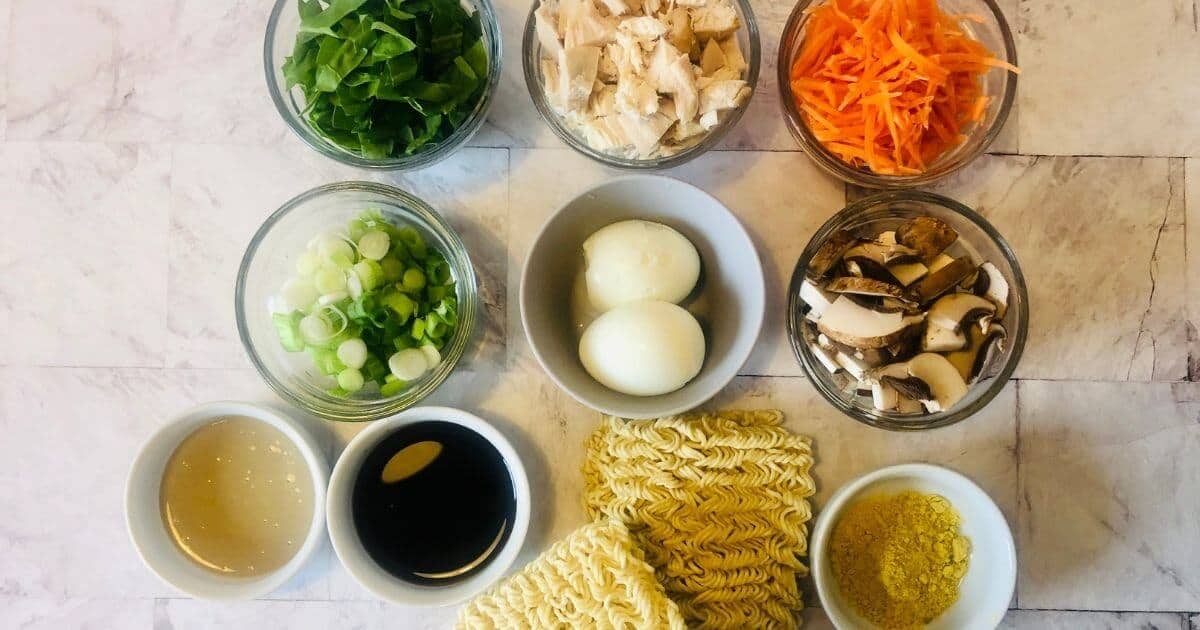
Ingredients
- Gluten-Free Rice Ramen Noodles (we love Lotus Foods)
- Shredded Carrots
- Mushrooms
- Baby Spinach
- Cooked, Diced Chicken Breasts
- Gluten-Free Miso Paste
- Gluten-Free Tamari Soy Sauce
- Chopped Scallions
- Hard-Boiled Eggs
Directions
- First, cook both packages of ramen noodles according to the directions on the package but do not add the seasoning packets yet.
- Next, add the shredded carrots, mushrooms, spinach, and chicken breasts to the water while it’s still boiling.
- After that, add the seasoning packets, stir well until completely mixed in, and then turn off the heat.
- Following that, you can decide how brothy you would like your ramen to be and strain out any broth that you do not want. I like to keep just a bit of broth so that it’s more noodles than soup.
- After that, you will want to stir in the miso paste and Tamari soy sauce.
- Then, top the ramen with the two boiled eggs cut in half (you will have 4 halves) and sprinkle on the scallions.
- Finally, serve your ramen in 4 bowls with each bowl getting one egg half, and enjoy a delicious family meal!
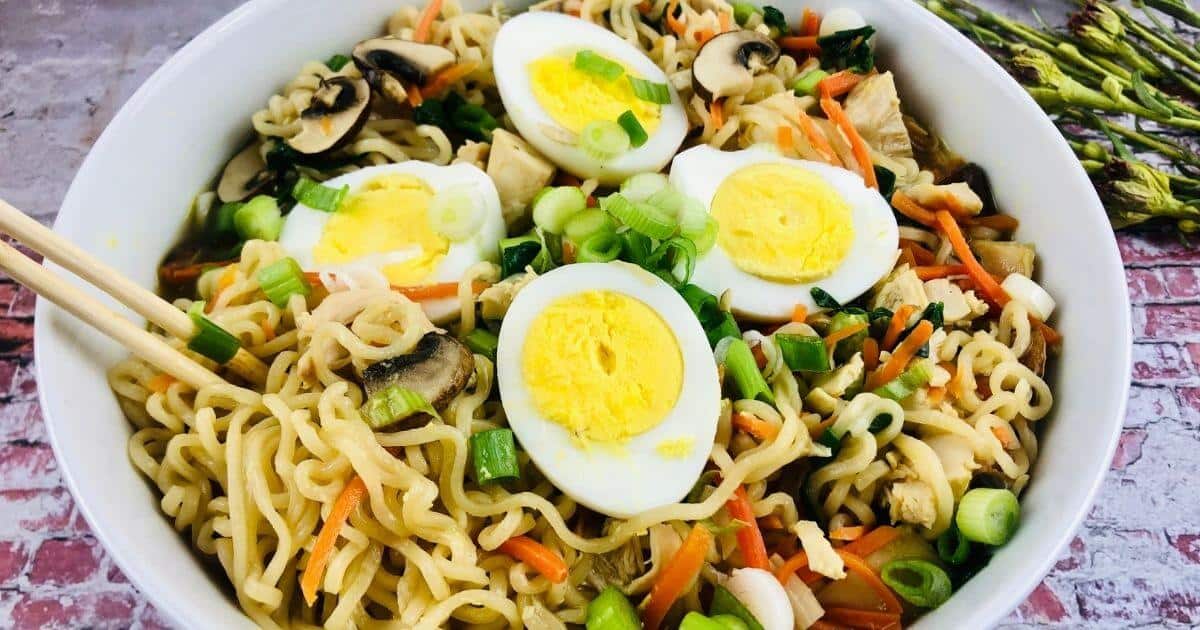
Tips on How to Make the Perfect Bowl of Ramen
Add a splash of oil to the bottom of the pot (yes, it can even be olive oil). Then saute any additional vegetables you wish to have with garlic until fragrant.
This is a great way to enhance the flavor of your soup with ingredients like herbs and spices. They can be added at different points during cooking, which will create slightly varied flavors throughout.
Bring the water/broth to boil then lower temperature to a low simmer then add some onion and ginger.

What Are The Best Gluten-free Ramen Noodle Alternatives?
The best alternatives to gluten-free ramen noodles are:
- Rice noodles
- Buckwheat noodles (soba)
- Glass noodles
- Kelp noodles
- Vegetable noodles
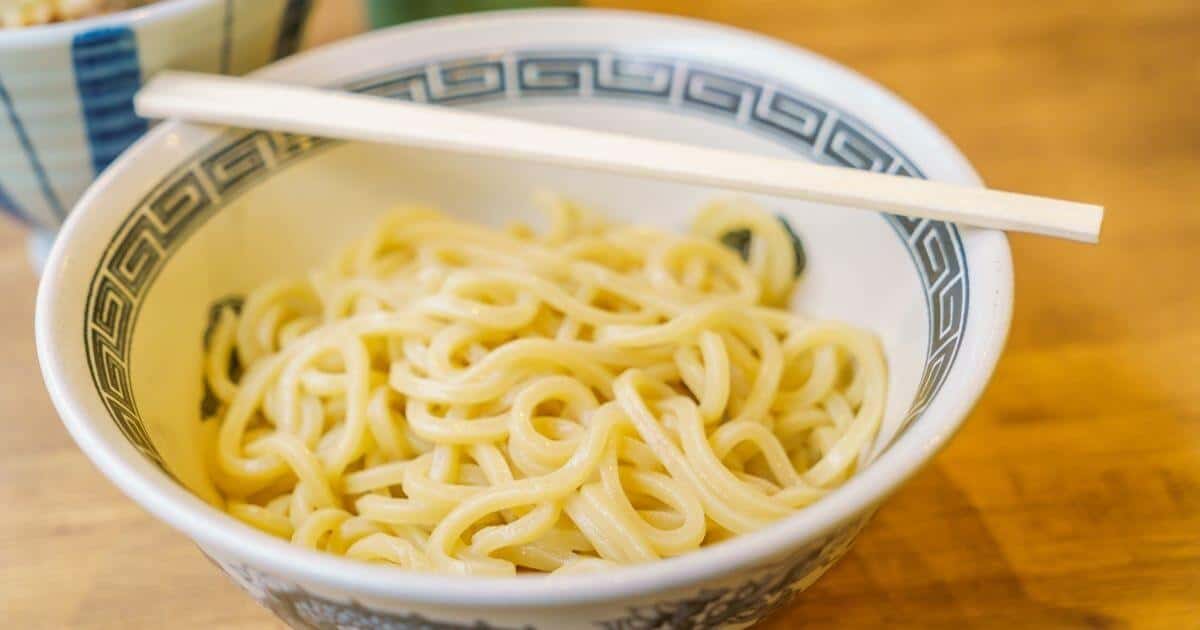
Different Types of Ramen
There are so many different types of ramen noodles that it's hard to nail down an accurate list.
Generally, there are four main types of noodles you can find in most grocery stores:
- Dried
- Fresh (often found in the refrigerated section)
- Vacuum packed for sale at the store but you have to cook them at home
- Instant/ready-to-eat
As we know, ramen noodles come in a number of shapes and variations. However, not all shapes are created equal.
In fact, it is important to know that different types come with different levels of flavor intensity based on what parts of the world they originate from.
For example, udon noodles are often found on their own or accompanying curry dishes in Japan and Korean restaurants outside Korea. Soba would be more typical with Japanese noodle dishes.
Ramen is a bowl of noodles in broth that comes with various toppings and ingredients, but most can be divided into two main categories - thin or thick. Thin ramen has broth made mostly from pork bones while the thicker type uses soy sauce as its base flavor.
Salt flavored ramen is typically served with a lot of different ingredients. These typically include vegetables, eggs, seafood (such as shrimp or crab meat), and other proteins such as pork shoulder.
Soy-flavored ramen features its broth made from soy sauce with a lot of the same protein ingredients found in traditional Chinese sesame oil-based dishes like stir-fries.
Vegan and Vegetarian Options
Ramen has become a popular Japanese dish in America and is typically served with either meat or vegetables.
If you are vegan, however, the noodles themselves can be made without animal products but still have tons of flavor because of all the spices they use to cook them!
Ramen is usually accompanied by broth as well as other ingredients such as seafood that makes it not vegetarian friendly.
However, if you're looking for something more flavorful (and spicy!), try ramen at your local grocery store.
Most varieties will include vegetarian alternatives such as soy sauce instead of fish seasoning which gives dishes just enough tangy zing you'll crave every day on lunch break from work!
You will also find that many restaurants serve vegetarian or vegan options on their menus, so it's always worth checking if there's a type you prefer there!

Gluten-free Ramen Noodle Brands and Alternatives
Many ramen noodles contain gluten, but there are also plenty that is gluten-free or a tasty alternative. Some of those options for avoiding gluten are:
- Gluten-free rice ramen noodles
- Rice noodles
- Buckwheat soba noodles
- Glass noodles
- Kelp noodles
- Shirataki noodles
- Vegetable noodles
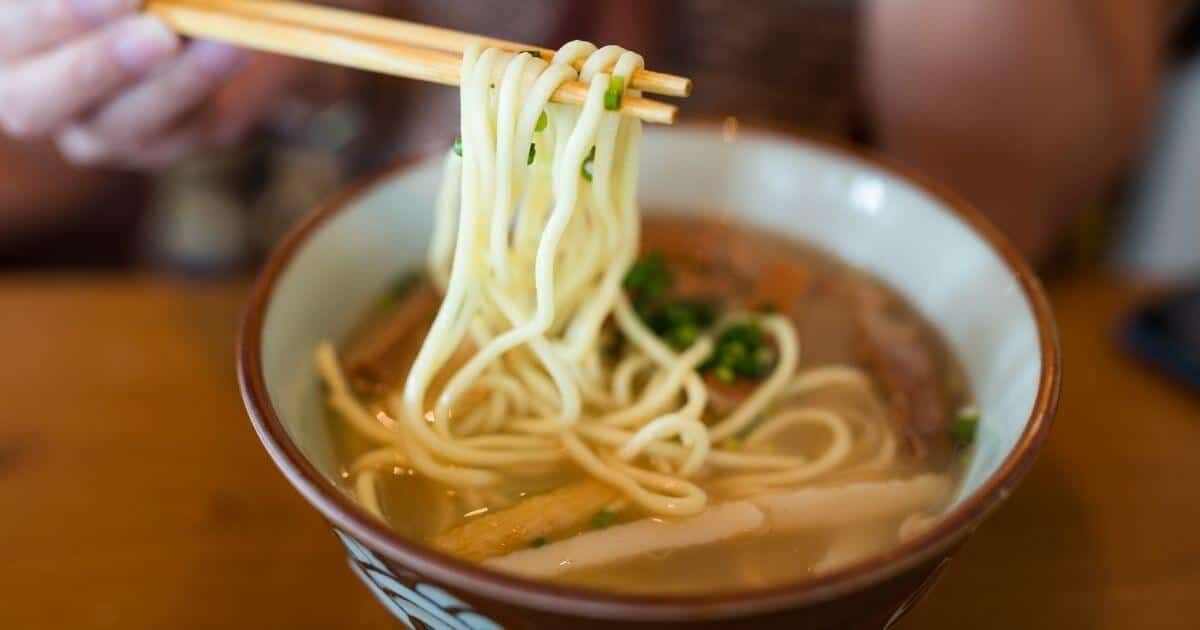
Gluten-free Ramen at Restaurants
Feel like going out instead of cooking at home and craving some delicious restaurant-style ramen? Many restaurants offer a gluten-free ramen option upon request. However, not all restaurants do.
One thing you can do to find a local restaurant that offers gluten-free ramen noodles on their menu is to google "gluten-free ramen noodles near me".
Google will hopefully pull up some results containing restaurant locations near you that contain gluten-free ramen on their menu.
Another thing you can do is to call your favorite Asian restaurant ahead of time. If they have a gluten-free menu, tell them that you're looking for ramen that is gluten-free and ask if they offer it.
Some people might not be aware of how difficult it can be to find a restaurant with gluten-free ramen on its menu. It just takes a little bit of searching and calling around sometimes to find what you are looking for.
However, if you can not find a local Asian restaurant in your area that serves a gluten-free version of ramen, and you are absolutely craving it, you can easily make your own homemade version. Just use the recipe I have provided in this post!
📖 Recipe
Want to Save This Recipe?
Enter your email & I'll send it to your inbox. Plus, get immediate access to new recipes as soon as they post.
By submitting this form, you consent to receive emails from Gluten Free Supper.
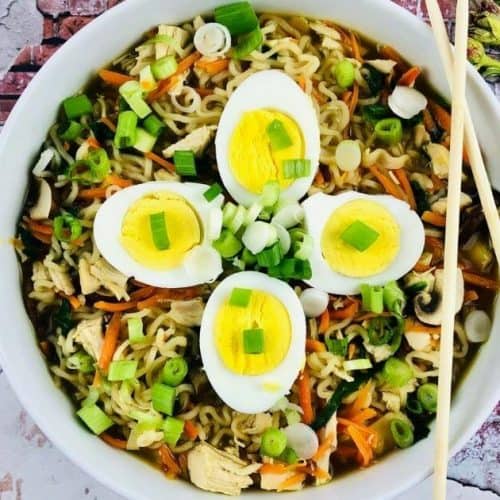
Gluten Free Ramen Noodles
Ingredients
- 2 pkg Gluten Free Rice Ramen Noodles we love Lotus Foods
- ½ C Shredded Carrots
- ½ C Mushrooms
- ½ C Baby Spinach
- 1 C Cooked Diced Chicken Breasts
- 2 tablespoon Gluten Free Miso Paste
- 4 teaspoon Gluten Free Tamari Soy Sauce
- ½ Cup Chopped Scallions
- 2 Hard Boiled Eggs
Instructions
- First, cook both packages of ramen noodles according to the directions on the package but do not add the seasoning packets yet.2 pkg Gluten Free Rice Ramen Noodles
- Next, add the shredded carrots, mushrooms, spinach, and chicken breasts to the water while it’s still boiling.½ C Shredded Carrots, ½ C Mushrooms, ½ C Baby Spinach, 1 C Cooked
- After that, add the seasoning packets, stir well until completely mixed in, and then turn off the heat.
- Following that, you can decide how brothy you would like your ramen to be and strain out any broth that you do not want. I like to keep just a bit of broth so that it’s more noodles than soup.
- After that, you will want to stir in the miso paste and Tamari soy sauce.2 tablespoon Gluten Free Miso Paste, 4 teaspoon Gluten Free Tamari Soy Sauce
- Then, top the ramen with the two boiled eggs cut in half (you will have 4 halves) and sprinkle on the scallions.2 Hard Boiled Eggs, ½ Cup Chopped Scallions
- Finally, serve your ramen in 4 bowls with each bowl getting one egg half, and enjoy a delicious family meal!
Video
Notes
Nutrition
Please comment and rate below if you loved this recipe, and don't forget to share with friends and family!


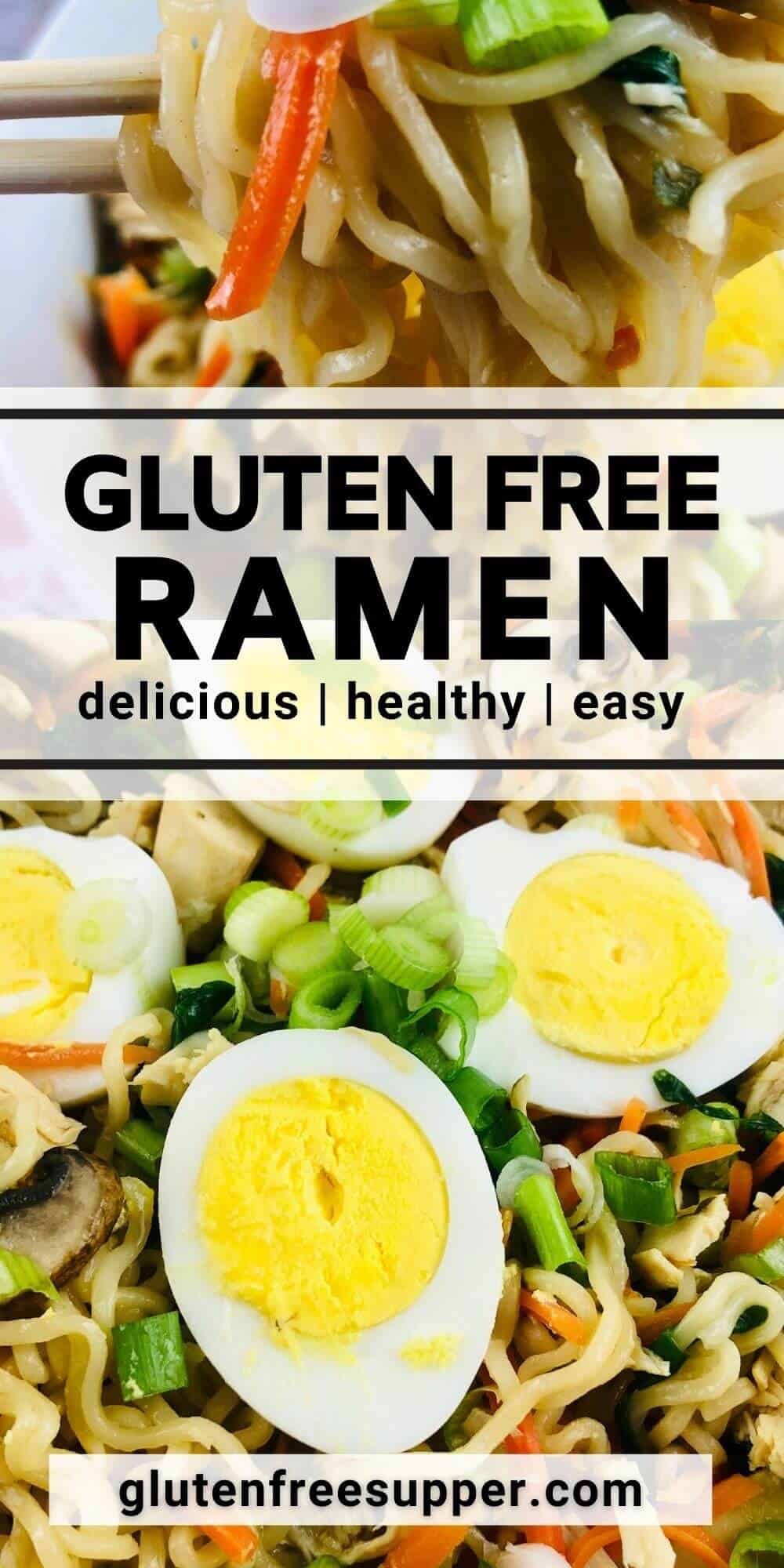
Leave a Reply